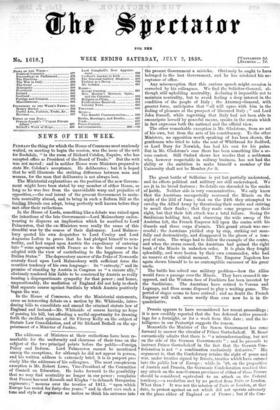The addresses of Ministers at their reelections have been re-
markable for the uniformity and clearness of their tone on the subject of the two principal points before the public—Foreign, Policy and Reform. Lord Palmerston cannot be mentioned among the exceptions, for although he did not appear in person, and his written address is extremely brief, it is in purport pre- cisely like the addresses of his colleagues. The most conspicuous exception is Mr. Robert Lowe, Vice-President of the Committee of Council on Education. He looks forward to the possibility that we may find neutrality no longer in our power ; complains that France has sent Kossuth and Klapka "to debauch Hungarian regiments ; " mourns over the treaties of 1815, "upon which Europe has rested for, forty-five years;" and in short uses such a tone and style of argninent as makes us think his entrance into the present Government a mistake. Obviously he ought to have belonged to the last Government, and he has misdated his ac- ceptance of office.
Any misconception that this curious speech might occasion is corrected by his colleagues. We find the Solicitor-General, al- though still upholding neutrality, declaring it impossible not to maintain neutrality, but to avoid feeling a deep interest in the condition of the people of Italy ; the Attorney-General, with greater force, anticipates that "all will agree with him in the feeling of pleasure at the prospect of liberated Italy ; " and Lord John Russell, while regretting that Italy had not been able to emancipate herself by peaceful means, speaks in the strain which in fact expresses both the national and the official view.
The other remarkable exception is Mr. Gladstone, from no act of his own, but from the acts of his constituency. To the other Ministers, no opposition worth speaking of has been shown the gentleman who tried to take the seat of Whitbread for Bedford, or Lord Bury for Norwich, has had his cost for his pains. But in Mr. Gladstone's ease there has been something like a se- vere contest. Still Oxford shows her resolve that a nobleman who, however respectable in railway business, has not had the ability or the ambition to make himself a member of the University shall not be Member for it.


























